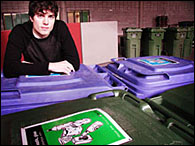The greening of McGill
Get ready to use more blue boxes at McGill. The university is kicking off 2003 by vastly expanding its recycling efforts on both campuses.
 Student coordinator for McGill's recycling initiative, Spencer Mann
Student coordinator for McGill's recycling initiative, Spencer MannPHOTO: Claudio Calligaris |
|
Every major downtown building, and very soon at Macdonald Campus, will feature at least one recycling station for the disposal of plastics, glass, metals and paper. Until now, only 17 percent of the university's waste —mostly paper -- was recycled through office and classroom blue boxes. Recuperation of other materials was possible only in a limited number of locations near food service areas.
Now, 120 multi-purpose recycling stations will be conveniently located in the lobbies of every building, from Burnside Hall to Redpath Library. Larger recycling depots will be available in the basements of most buildings, too.
The university's new recycling measures are being implemented as part of McGill's Environmental Policy. The policy was approved by Senate in spring 2001, largely in response to student requests for increased environmental friendliness.
The new recycling program is the result of the creation of the university's Subcommittee on the Environment, which teamed up with the Environmental Safety Office on establishing a greener McGill. The subcommittee conducted a thorough review of McGill's energy and waste management -- including a waste audit -- in an effort to improve environmental efficiency.
The subcommittee recommended that McGill fortify recycling and improve environmental efficiency in three phases. Vice-Principal (Administration and Finance) Morty Yalovsky says that in its 2002-2003 budget, McGill has allocated $120,000 to implement environmental programs.
Approximately $30,000 of that budget was used to purchase new recycling stations, he says, while the balance will be spent on maintenance of the recycling program, special projects and the hiring of a full-time environmental officer for the university. "Our environmental officer will examine the different initiatives McGill can take to be environmentally friendlier," Yalovsky says, adding the position should be filled this winter.
Wayne Wood, manager of the Environmental Safety Office, says hiring an environmental officer will do much to bolster McGill's environmental friendliness. "We want this person to be bilingual, have good communications skills, a background in environmental studies and plenty of enthusiasm and energy," he says. "Enough energy that they'll be able to cut through red tape and get things done quickly and oversee those changes."
The new hire will act as internal liaison with students, administration, faculty and other McGillians concerned about green issues. The person will also network with external groups, including the Conférence des Recteurs et Principaux du Québec, to compare McGill's environmental practices with its sister institutions.
The environmental staffer will even seek out "green money" from funding agencies to develop and support environmentally innovative projects. "This person will be McGill's number one resource on the environment," Wood says.
As for the university's new recycling system, it will rely on strong partnerships between McGill, the City of Montreal and recycling contractors. McGill plans to streamline recycling operations by centralizing all recuperation services under Buildings and Grounds Services and Facilities Management.
Of course, adding new recycling stations will require increased maintenance. But Giovanni Nuzzi, director of Buildings and Grounds Services, says beefing up recycling will be a seamless process that won't overtax his staff. Instead of carting away garbage, he says, employees will monitor recycling stations more frequently. "The impact on my staff will be minimal."
As student coordinator for McGill's recycling initiative, Spencer Mann oversaw the implementation of the project throughout the university and was one of three student representatives on the Subcommittee on the Environment.
As our population starts favouring recycling bins over trashcans, he hopes, "McGill will pluck garbage cans away and add more recycling stations."
Mann, a student at McGill's School for the Environment, also looks forward to the day when the university introduces more measures to cut down on waste, such as composting residence or cafeteria waste. "If you look at the breakdown of McGill's waste stream," he says, "95 percent of that waste could eventually be recycled."
Besides waste, the Environ-mental Policy stipulates that the university will endeavor to prevent the overconsumption of energy and other resources. McGill plans to construct its new arts building, for instance, with as many energy-saving devices as possible. It makes good economic sense to do so, says Yalovsky, "wherever possible."
Another practice the university is working towards is to maintain purchasing policies that favour environmentally benign or non-toxic products.
Having seen the university take concrete actions to becoming greener, Mann is happy student activism led to McGill establishing the Environmental Policy. "As a microcosm of the larger world," Mann says, "McGill can lead the way in new initiatives."
Wood agrees. "Measures en-couraged by McGill's Environment Policy can make a significant impact on the environment," he says. "The beauty of a university initiating increased environmental friendliness is how it can sensitize others."
McGill's remaining challenge is to alter current university culture and get people recycling more than just paper. "If the program is successful," he says, "the great thing is we'll get people rethinking about their environment at work and at home."
For information on McGill's new recycling program, please consult: www.mcgill.ca/rethink/.

